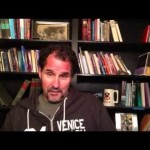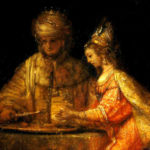We run our website the way we wished the whole internet worked: we provide high quality original content with no ads. We are funded solely by your direct support. Please consider supporting this project.
How do you respond to John 6:44?
“No one can come to me unless drawn by the Father who sent me…”
Calvinists sometimes argue that this passage teaches that the Father chooses and then “draws” certain people to Christ. Those who are “drawn” certainly come to Christ (John 6:37) while all who are not drawn remain in their sin. In short, this passage is interpreted to teach “particular election” (that is, God chooses to save some and not to save others).
It is true that the “drawing” Jesus speaks of is not universal, as some Arminians suggest, since Jesus is here contrasting those who are “drawn” with those who are not. But neither this or any other passage requires us to believe that the Father simply decides who will and will not be drawn. The Father “draws” people (or not) in response to their hearts.
God wants all to be saved and is working in every human heart to get each person to accept the Gospel. But people can and do resist God’s influence and thwart his will for their lives (see e.g. Lk 7:30). When a heart has been successfully opened, however, God goes further and “draws” that person to Jesus Christ.
Category: Q&A
Tags: Q&A, Responding to Calvinism
Topics: Providence, Predestination and Free Will, Responding to Objections
Verse: John 6
Related Reading

What is the significance of 1 Samuel 15:10?
In light of Saul’s sin the Lord says, “I regret that I made Saul king, for he has turned back from following me.” Common sense would suggest that one can only regret a decision one makes if the decision results in an outcome other than what was expected or hoped for. If God foreknows all…

Video Q&A: Do you think Jehovah’s Witnesses and Mormons are saved?
Does Greg believe that everyone goes to Heaven regardless of their beliefs? Find out here.

What is the significance of Esther 4:14?
The wise Mordecai encourages Esther to bravely risk her life by pleading the case of the Jews before King Xerxes, saying, “…if you remain silent at this time, relief and deliverance for the Jews will arise from another place, but you and your father’s family will perish. And who knows but that you have come…

Are you a pietist?
Question: Soon after the publication of your book The Myth of a Christian Nation, I heard Chuck Colson charge you with being a “pietist.” Since then, others have repeated the charge. They all claim you advocate a Gospel that focuses on individual salvation but leaves social issues for government to address. Are you a pietist?…

How do you respond to Jeremiah 1:5
The Lord says to Jeremiah, “Before I formed you in the womb I knew you, and before you were born I consecrated you; I appointed you a prophet to the nations.” This verse shows God’s love and plan for Jeremiah before he was born. This does not imply that Jeremiah could not have “rejected God’s…

Is it true you’re an “Open Theist” and that you don’t think God knows the future perfectly?
I am an “Open Theist” – though I honestly don’t care for the label, because as I’ll show, the uniqueness of this view isn’t in what it says about God but in what it says about the nature of reality. (I think it would be better to call us something like “Open Futurists.”) In any…
